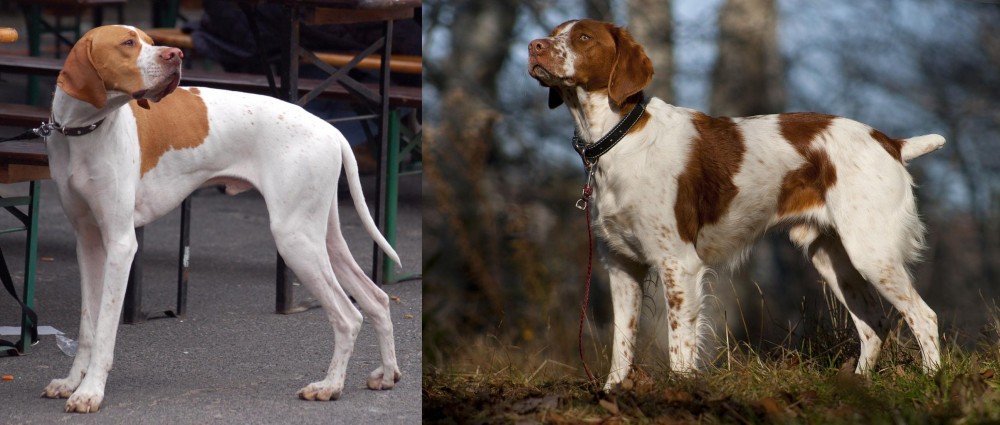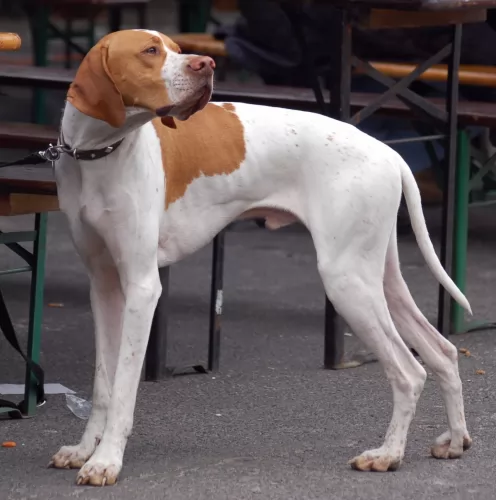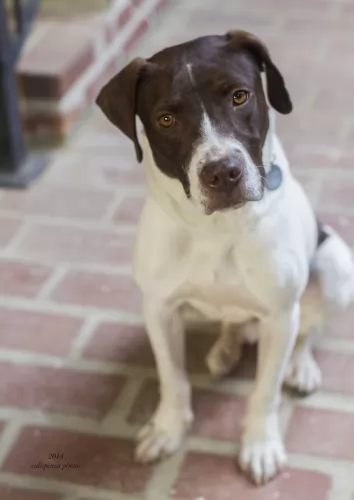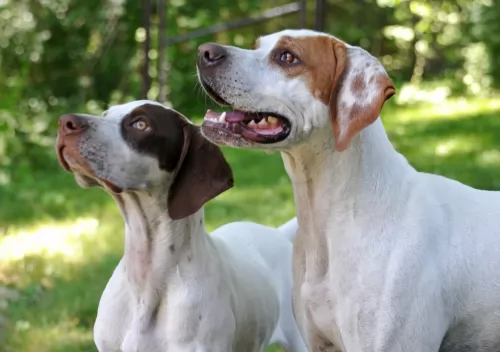 Petzlover
Petzlover English Pointer is originated from United Kingdom but Brittany is originated from France. English Pointer may grow 18 cm / 8 inches higher than Brittany. English Pointer may weigh 14 kg / 31 pounds more than Brittany. Both English Pointer and Brittany has almost same life span. Both English Pointer and Brittany has almost same litter size. Both English Pointer and Brittany requires Low Maintenance.
English Pointer is originated from United Kingdom but Brittany is originated from France. English Pointer may grow 18 cm / 8 inches higher than Brittany. English Pointer may weigh 14 kg / 31 pounds more than Brittany. Both English Pointer and Brittany has almost same life span. Both English Pointer and Brittany has almost same litter size. Both English Pointer and Brittany requires Low Maintenance.
 We can find records for pointers from 17th century. Breeds such as Old Spanish and Portuguese Pointer were set in to England from European Mainland. In 1800s they were brought to America and then they slowly developed their hunting skills and in 1910 they became an excellent bird hunter. In 1936 Modern American Kennel was established and they bred pointers in large quantities. They are very popular in southern United States and are called as "bird dog". Pointers are good in hunting birds like pheasant and grouse. They got their name because of their special skills in hunting.
We can find records for pointers from 17th century. Breeds such as Old Spanish and Portuguese Pointer were set in to England from European Mainland. In 1800s they were brought to America and then they slowly developed their hunting skills and in 1910 they became an excellent bird hunter. In 1936 Modern American Kennel was established and they bred pointers in large quantities. They are very popular in southern United States and are called as "bird dog". Pointers are good in hunting birds like pheasant and grouse. They got their name because of their special skills in hunting.
 One of the most intense bird dog breeds in existence is the Brittany, bred for hunt. The breed used to be called the Brittany Spaniel, but since the breed is closer to a setter or pointer, that moniker has been dropped. The Brittany is named for the French Province in which they were originally developed. Sometime from the 17th to the 19th centuries, the breed was developed. Images of a very similar dog can be found on 17th century paintings and tapestries. However, the first written description comes from 1850 by a Reverend Davies, describing a hunting episode. The breed was recognized officially in the early part of the 20th century and made a splash at the 1900 Paris Dog Show.
One of the most intense bird dog breeds in existence is the Brittany, bred for hunt. The breed used to be called the Brittany Spaniel, but since the breed is closer to a setter or pointer, that moniker has been dropped. The Brittany is named for the French Province in which they were originally developed. Sometime from the 17th to the 19th centuries, the breed was developed. Images of a very similar dog can be found on 17th century paintings and tapestries. However, the first written description comes from 1850 by a Reverend Davies, describing a hunting episode. The breed was recognized officially in the early part of the 20th century and made a splash at the 1900 Paris Dog Show.
The first official standards were written in about 1907 and the breed was recognized by the American Kennel Club (AKC) in 1934.The Brittany is expected to point to and then retrieve birds and other small ground game. Because the Brittany both points and retrieves they are known in the U.K. as a Hunt, Point and Retrieve breed or an HPR, and they have more Dual Champions than the rest of the AKC Sporting group.
There are actually two types of Brittanys in the minds of many breeders. There is the “French” Brittany and the “American” Brittany. When the breed arrived in the United States in 1931 they became immensely popular in a short period of time. In 1942 American Breeders began the American Brittany Club, rewriting the French standard to fit the dog they knew. Today there are definitely difference between the two sub-sets that can easily be seen. The French dog is smaller than the American dog. The American dog is a runner pacing ahead of the hunter while the French dog works more closely with their human companions. Another visible difference is that the French accept black spotted Brittanys, while in the United States a black spotted coat is considered a fault. Both sub-sets are known for their willingness to follow human directions, their eagerness for the hunt, and their agility and speed.
Unfortunately, the European wars took their toll on this breed as they did on many others. Following the second World War, their numbers in Europe were drastically reduced. The French had stop breeding them altogether during the war. It was in this depleted gene pool that the French agreed to accept the black spotted Brittany. Along with the U.S., Canada also does not recognize the black spotted Brittany.
 Pointer has a long head and its body is perfectly suitable for hunting. In hunting the pointers shows hunter the direction of the bird and also they will go and get them after they were shot. They are well known for their speed, energy and continuous working. Pointers are also a good companion dog and love the family members so much. It is very easy to groom them as they have short coat. They are very alert and excellent watch dog.
Pointer has a long head and its body is perfectly suitable for hunting. In hunting the pointers shows hunter the direction of the bird and also they will go and get them after they were shot. They are well known for their speed, energy and continuous working. Pointers are also a good companion dog and love the family members so much. It is very easy to groom them as they have short coat. They are very alert and excellent watch dog.
If pointer is not set in huntng then they should be given lots of exercise daily. Pointers love to play and run with children. They will give a good company for cyclists. Pointers show their talents in dog shows especially in obedience and field trials. They will not worry about the crowd surrounding them and performs well. In performing at public, pointer will show perfect attention to its master. Pointer must be trained slowly from its puppyhood to get good results.
 The Brittany is much like other hunting dogs – pointers and retrievers – in size and stature. He is solid and strong but not heavy. He is compact with an average size head and floppy ears, docked tails or short natural tails, and expressively intelligent looking eyes. He is athletic, energetic, and alert. He has a long, elastic and free gait. The French dog is smaller and the dog with black spots is accepted. The American Brittany is larger and only a tri-color of orange, liver and white is acceptable.
The Brittany is much like other hunting dogs – pointers and retrievers – in size and stature. He is solid and strong but not heavy. He is compact with an average size head and floppy ears, docked tails or short natural tails, and expressively intelligent looking eyes. He is athletic, energetic, and alert. He has a long, elastic and free gait. The French dog is smaller and the dog with black spots is accepted. The American Brittany is larger and only a tri-color of orange, liver and white is acceptable.
 Pointer is a wonderful kid friendly dog and a nice companion. Also he is very energetic,fun-loving and an excellent watchdog. Pointers are very courageous as well as obedient. They can work for a very long time. Early socialization will make them with a good behaviour.
Pointer is a wonderful kid friendly dog and a nice companion. Also he is very energetic,fun-loving and an excellent watchdog. Pointers are very courageous as well as obedient. They can work for a very long time. Early socialization will make them with a good behaviour.
They will be happy if they are given a fenced yard to play and spend their natural energy. They will not have a good behaviour in apartment living. Pointers always likes to be with some one in his family. They are suitable for areas having hot weather and they will not do better in cold weather.
Pointers have very high intelligence and thus they are very easy to train. Good behaviours must be taught to them and the main word they must learn is "NO". They should stop what they are doing when they hear the word "NO" from you. "Sit" is another important word they should learn. Training should be given friendly and not compelling them to do it. Giving reward to them will make them happy and give more interest in training.
 The Brittany is particularly trainable and friendly. They love to play and are sweet-natured. They don’t due well with harsh correction though and a stern look will cause them to wither. Socialize them young or they can become shy around strangers. They are loyal and family oriented. They can easily become attached to their humans.
The Brittany is particularly trainable and friendly. They love to play and are sweet-natured. They don’t due well with harsh correction though and a stern look will cause them to wither. Socialize them young or they can become shy around strangers. They are loyal and family oriented. They can easily become attached to their humans.
 Pointers face health problems such as gastric torsion, hypothyroidism and canine hip dysplasia. Overweight will also lead to many health problems in them. Other problems seen in them are cardiomyopathy, ectropion and progressive retinal atrophy.
Pointers face health problems such as gastric torsion, hypothyroidism and canine hip dysplasia. Overweight will also lead to many health problems in them. Other problems seen in them are cardiomyopathy, ectropion and progressive retinal atrophy.
They have the chances to get several skin disorders which leads to hairfall. Follicular Dysplasia is a hereditary disorder which causes hairfall. Special shampoos or lotion to combat the dry skin should be used to overcome this problem.
 The breed is a hardy one and Brittanys are mostly healthy dogs. In Europe 1 in 5 dogs dies of old age and that age is usually 14 or 15 years. They do have a few issues that they may be susceptible to. These would include:
The breed is a hardy one and Brittanys are mostly healthy dogs. In Europe 1 in 5 dogs dies of old age and that age is usually 14 or 15 years. They do have a few issues that they may be susceptible to. These would include:
 Normally puppies require more food when compared with adult to meet their growth needs. The food given to the pointer puppy must contain vitamins, carbohydrates and minerals. Also the food given to his mother should be continued to the puppy as to avoid digestive problems for the puppy. If it is needed to change the food then it should be done in a step by step process.
Normally puppies require more food when compared with adult to meet their growth needs. The food given to the pointer puppy must contain vitamins, carbohydrates and minerals. Also the food given to his mother should be continued to the puppy as to avoid digestive problems for the puppy. If it is needed to change the food then it should be done in a step by step process.
Pointer can be fed one or two times a day. Usally small meal is given in morning and full meal will be given in the evening. But in case if they will be left alone for the whole day then morning food shall be a full meal. They can be fed meat of goat, pork, fish and woodcock. Brown rice is a good food for pointer.
Pointers will be happy if they are always with their family. They enjoy when they are taken outside for playing or camping. Puppies don't need much exercise as adults need. Adults should not be fed too much as it will lead to overweight.
When pointer is given proper exercises and training they will be a very good mannered dog. They are very active and intelligent dogs and hence require exercise and training regularly. The breed was developed to be a hunting dog and can work continuously in a day. Pointers should be exercised a minimum of an hour per day. They will be happy to run along with your bicycle and playing frisbee with you.
 Don’t overfeed your Brittany. Keep him at hunting weight by feeding a half a cup up to 2 cups per day depending on the size of your dog and activity levels. Serve this in two meals not one.
Don’t overfeed your Brittany. Keep him at hunting weight by feeding a half a cup up to 2 cups per day depending on the size of your dog and activity levels. Serve this in two meals not one.
Ears – prone to infections – make sure that you check them and wipe them out routinely to prevent infections.
Hip Dysplasia – bones don’t fit well into joints – this can be genetic or otherwise, causing lameness and arthritis. If severe it can require surgery to correct.
Epilepsy – mild or serious seizures are possible. This can be genetic/hereditary but is set off by an infectious disease of the brain, head injury, poison, tumor, or metabolic disorder. There is no cure, but medication can be very effective.
Hypothyroidism – Low levels of thyroid hormone – can cause drooping eyelids, obesity, lethargy, mental difficulties or irregular heat cycles or all of this. Medication is available as it is for humans but must be taken daily for the rest of the dog’s life
Canine Discoid Lupus Erythematosus – autoimmune disease that is rare in dogs. Cats and humans can also have it. It is a skin disease and does not become the more serious and deadly Systemic Lupus. The Discoid version of this disease causes loss of pigmentation and a scaling on the nose which can then progress to the skin around the ears, eyes and genitals. There could be ulcerated lesions and tissue death in more severe cases. Sun exposure can make the condition worse.
The Brittany is a hunting dog that acts like a pointer but will retrieve fowl and birds in the water or on land. If you don’t hunt, the Brittany can still be your family dog. They need lots of exercise and mental stimulation. They need a job if they are not going to hunt and expect them to be distracted by every bird they see. Try flyball, agility, FAST CAT, field trials and dock diving. They are very task oriented and have boundless energy. They excel at obedience and confirmation as well.